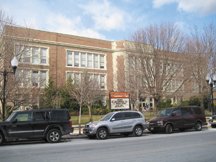Next August, Memorial High School Class of ’11 will have the usual case of pre-college jitters before starting college, but one question removed from their minds may be “Am I ‘college-ready’?
That’s because this year, MHS entered into a partnership with Syracuse University Project Advance, which brought eight Syracuse University courses into the high school’s classrooms.
“It’s just like being on campus, except you’re taking it here.” – Principal Scott Cannao
________
Steadily declining college-bound rate
For years, MHS’ college-bound graduation rate had been the steadily declining, with the current rate hovering around 35 to 40 percent, compared to 70 to 80 percent during the 1980s.
A lot of that, according to Principal Scott Cannao, had to do with demographics and finances. Although West New York’s immigrant community has always been poor, the changing demographic to Latin American residents brought with it the problem of legal status. Whereas less well-off students can apply for financial aid, students without a Social Security card do not have that option.
This resulted in many students opting for two-year colleges after graduation or nothing at all.
“The [students and their families] just couldn’t pay for the schools,” Cannao said.
Another issue for MHS students, many of whom come from single-parent households and speak English as a second language, was that of college preparedness. Canno said that while MHS offers honors and AP courses, many students have doubts about their ability to handle the transition to a more challenging college course load.
Concurrent enrollment
While brainstorming for a way to increase college-bound rates, Cannao looked around at other districts in the area, many of whom were offering college courses to their students, or concurrent enrollment programs. By offering the same at MHS, Cannao realized, he could tackle the issue of finances and college preparedness in one fell swoop.
Cannao, his administrators and faculty, and West New York School District Superintendent Robert Sanchez decided upon Syracuse University’s Project Advance program, and sent a team of MHS teachers to Syracuse for syllabus and curriculum training so that they would be able to serve as SU adjuncts and teach actual college classes in the high school.
“We jumped right in…the teachers were excited about it,” Cannao said.
In its first year this September, 95 MHS students enrolled in Project Advance courses in Calculus, American History, College Learning Strategies, Sociology, Italian, and Language Arts, with some students taking more than one class.
“It’s not an honors class in the high school. It’s a college class,” Cannao said. “It’s just like being on campus, except you’re taking it here.”
Upon completion, students receive college credits (and high school credits), but for a tenth of Syracuse’s price.
For each student, Syracuse University looks at his or her family’s income tax and determines payment on a sliding scale, with the cost of one credit ranging from $44 to $110, according to MHS Guidance Counselor Stacey Bogert. Thus, for the three-credit courses offered, a MHS student will pay between $132 and $330 per course.
According to Syracuse University, the credits transfer to 95 percent of schools, excluding only Ivy League schools, which Cannao said “don’t accept transfer credits from anywhere.”
A warm reception
The program is rolling along and both students and parents are “really into the whole thing,” according to Cannao.
He continued, “There’s normally some negative feedback when you do new things, but there’s none here.”
Also, enrolled students, he noticed, have started to act more mature since starting the program.
“It gives them a sense of accomplishment that they can actually do the work. They think ‘I can do this.’ It’s easier for them in the transition,” Cannao said.
Ultimately, he would like to expand the program and offer college classes in each one of the academics, and perhaps add more affiliate universities, but “it’s just a matter of finding the right fit.”
“We’re continually looking at new and different programs [here at MHS],” Cannao said.
Deanna Cullen can be reached at dcullen@hudsonreporter.com.
